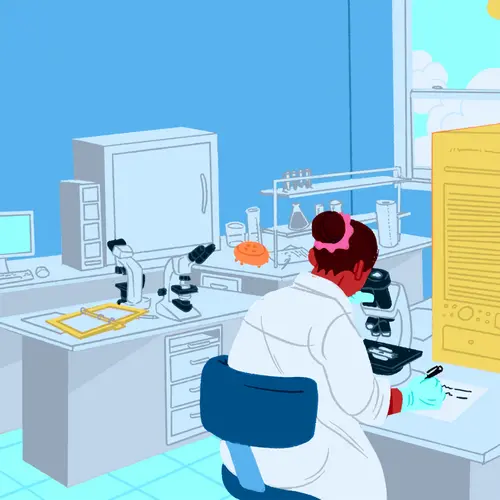If your child has cancer, they'll likely get treated by a doctor who specializes in pediatric oncology. It's the study and treatment of childhood cancer.
Most cancers that are common in children are different from those seen in adults. Pediatric oncology focuses on cancers in infants, children, and teens. Doctors in pediatric oncology are specially trained to care for your child and keep them comfortable during their treatment.
Types of Childhood Cancer
While your child could still get cancers that are more common in adults, cancers that are often seen in children include:
- Leukemia
- Brain and spinal cord tumors
- Neuroblastoma
- Wilms tumor
- Lymphoma
- Rhabdomyosarcoma
- Retinoblastoma
- Bone cancer
Cancer treatment tends to work better in children than adults. Kids often don't have other conditions along with their cancer, the way some adults do. That means their bodies can handle stronger treatments than grown-ups’ bodies.
How Pediatric Oncology Helps Your Child
Doctors who focus on pediatric oncology are pediatricians who had extra training in cancer treatment. These doctors look for and diagnose childhood cancers and suggest the best treatment for your child.
Children with cancer typically respond better to treatments, such as chemotherapy, which uses strong medication to kill cancer cells. Doctors will often use chemotherapy to care for your child instead of surgery or radiation therapy, which is often used for adults.
Diagnosing Childhood Cancer
Your doctor will ask you about your child's medical history, symptoms, and family history of cancer. Some children are more likely to get cancer if family members have had cancer.
Your doctor may also ask your child to get tests to check for signs of cancer, such as imaging tests like X-rays or MRIs. They may also suggest your child get a "biopsy." In that test, a doctor removes a sample of your child's tissue and sends it to a lab to get checked for cancer cells.
If the tests confirm cancer, your doctor may let you know the stage of the disease. Staging tells you how far the cancer has spread and helps your doctor figure out the best treatment.
Cancer can be at stage I, II, III, or IV. If the stage is a lower number, it means your child's cancer has not spread far through their body. If it's higher, the cancer has grown more.
Chemotherapy for Childhood Cancer
Chemotherapy reaches every part of your child's body, not only the cancer cells. Your child may get different side effects, depending on which medicine they take.
The doctor may suggest medicines or treatments to ease your child's side effects. Sometimes chemotherapy can lead to long-term side effects in your child.
Surgery for Childhood Cancer
Sometimes your child may need surgery to help get rid of pain or discomfort related to cancer. Depending on what type of cancer your child has, they may need only one surgery or a series of operations over time.
The doctor may also suggest surgery to help prevent the spread of cancer, diagnose the type, figure out the stage, and treat it.
Side effects of cancer surgery include problems like bleeding and blood clots. Tissue near the area of surgery can also get damaged, as well as nearby organs. There's also a chance your child could have a reaction to medicine or come down with an infection.
Radiation Therapy for Childhood Cancer
Radiation is a type of cancer therapy that involves high-energy waves or particles that kill cancer cells and shrink tumors. Your child may need radiation therapy before surgery or chemotherapy so that the tumor becomes small enough to remove. Other times, your child will get radiation without any need for surgery.
Unlike chemotherapy, radiation therapy only damages cells -- both cancer and healthy ones -- in the area of your child's body that gets treated.
Doctors will make sure your child gets a safe amount of radiation that targets your child's cancer without badly damaging other organs.
Side effects from radiation include slight cell damage, fatigue, decreased blood counts, hair loss, or skin changes such as redness or sensitivity.
Some children also get long-term, or "late," effects due to cell damage. Long-term effects can vary, depending on the area treated on your child's body, amount of radiation, and age of your child. Your child will likely need follow-up visits with their doctor throughout their life to check for problems that may not show up until years after radiation therapy.
Symptoms of Childhood Cancer
While many cancers are found early by your child's doctor, some cancers can be hard to find because their symptoms are like those of common illnesses and injuries.
To improve the chances of early diagnosis, it's important to bring your child to a doctor if they show symptoms like:
- Quick weight loss
- Unexpected vision changes
- Constant headaches
- Fevers that do not go away
- Limping
- Constant pain in a part of their body
- Easy bleeding or bruising
- Lack of energy
- Unexplained paleness
- An unexplained lump or swelling
While these symptoms are most likely related to a less serious illness or injury, it's important to have your child see a doctor if any of them continue.
Getting Support
Finding out that your child has cancer affects every part of your family's life. To help your family understand and adjust, most doctors will suggest services to support your child. Your doctor may recommend that you and your child speak with a psychologist or counselor to help your family understand your child's cancer.
Many childhood cancer centers offer a friendly atmosphere to help your child feel safe during their treatment. Social workers are often available to help your child adjust their school and social schedules around their treatment. Your child's doctors are taught to speak to your family and child about their cancer treatment in an easy-to-understand and comforting way.

